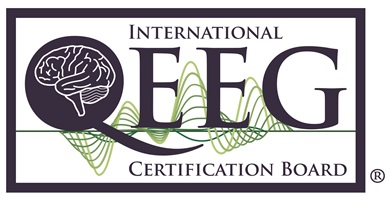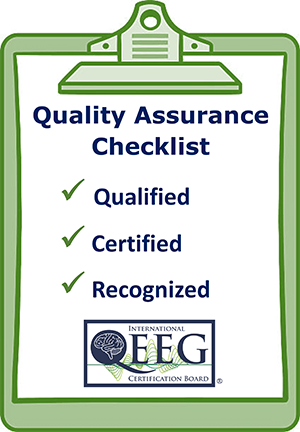Quality assurance is the point of the IQCB. With the advent of high quality, lower cost recording equipment, the availability of normative EEG databases, and many demonstrations that the electrical rhythms of the brain are functionally significant, many clinicians desire to use the technology. Increasing numbers of clinicians are now using quantitative EEG analyses to help understand the causes of patient’s symptoms and to determine the most useful training targets for neurofeedback.
Quantitative EEG was historically done in university research laboratory settings by highly trained EEG technicians or graduate students, supervised by MDs and PhDs trained in making and interpreting high quality EEG recordings. For example, I did my graduate research on EEG and ERP concomitants of conscious states, supervised by senior researchers at UC Santa Barbara, UCSD and UCLA. The question is, how do people who don’t have an intensive background in psychophysiology and electrophysiology become competent enough to use quantitative EEG methods to support clinical interventions?
The answer is the certification process of the IQCB. We can’t give you 30 years of experience, but we can certify that you’ve got the basic training to make competent EEG recordings and interpretations of the results that relate raw EEG results and quantitative statistical findings to clinical presentations.
John K. Nash, PhD, Licensed Psychologist, IQCB Diplomate (L) and Board Member





I agree completely, John. I spent years practicing and attending many didactic sessions to increase my knowledge and experience. I was never more proud to earn my QEEG-DL. I hope that all practitioners in our field will endeavor to achieve this distinction!
Allison Hartzoge
MA, LPC-S, NCC, BCN, QEEG-DL
Licensed Professional Counselor- Supervisor
National Certified Counselor
Board Certified in Neurofeedback – Fellow
Board Certified in Quantitative EEG – Diplomate Licensed/Board Chairperson
Owner/Founder, Archway
Executive Director, Archway Outreach 501(c)(3)
Thank you for your helpful comments, Dr Nash. Yes – quality assurance is our focus, especially with foundational training in EEG acquisition.
We help focus on optimal education and training in EEG – and certification in QEEG. Obtaining the highest quality EEG acquisition is of the utmost importance for those in our field – for if the EEG is not of the best quality, or is not personally reviewed during and after recording, then the subsequent QEEG analysis will yield incorrect, if not useless and irrelevant, information that may be erroneously used for clinical application.
Quality assurance is a longitudinal, continuous process – and our education and certification goals guide this process leading to certified clinicians who produce the best quality EEG data and similarly clinically valid and useful QEEG results.